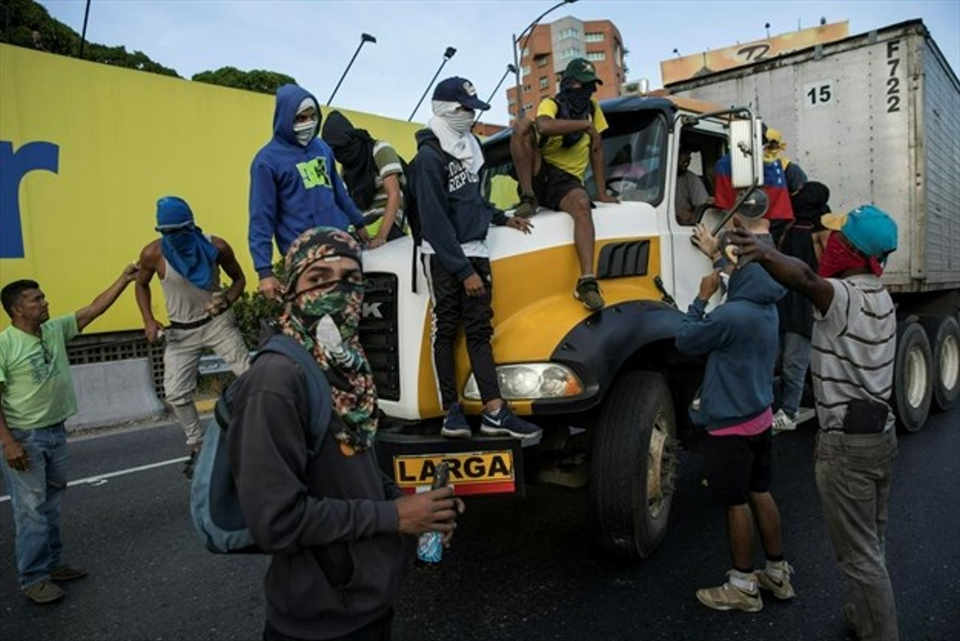Venezuela’s leader of the opposition and self-proclaimed president, Juan Guaido, called on more members of the military to abandon the government of Nicolas Maduro following the defection of a high-ranking general.

Meanwhile, Nicolas Maduro proposed holding early National Assembly elections that could potentially oust his challenger.
Maduro’s call for early legislative voting is likely to intensify his standoff with Guaido, who is demanding a new presidential election.
Guaido declared himself Venezuela’s legitimate ruler on January 23, and has the support of the United States, Canada, the Lima Group of countries that includes Argentina, Brazil, Canada, Chile, Colombia, Costa Rica, Guatemala, Honduras, Mexico, Panama, Paraguay and Peru and other South American nations.
In Canada, Prime Minister Justin Trudeau’s office said he spoke with Guaido on Sunday about the need for countries to send a clear message about “the illegitimacy of the Maduro regime.”
The call comes a day before Canada and its allies in the Lima Group are set to meet in that nation’s capital, Ottawa.
The gathering of more than a dozen of Canada’s Western Hemisphere allies is meant to find new ways to support the Venezuelan opposition.
Speaking from behind a podium decorated with Venezuela’s presidential seal on Saturday, Guaido told supporters he would keep his opposition movement in the streets until Maduro stopped “usurping” the presidency and agreed to a presidential election overseen by international observers.
On Saturday, tens of thousands of Venezuelans joined protests against Maduro in Caracas and other cities.
Guaido called on “blocks” of the military to defect from Maduro’s administration and “get on the side of the Venezuelan people.”
“We don’t just want you to stop shooting at protesters,” Guaido said in a hoarse voice. “We want you to be part of the reconstruction of Venezuela.”
Maduro has dug in his heels, insisting he is the only president of Venezuela and describing Saturday’s anti-government protests as part of a U.S.-led coup attempt.
“I agree that the legislative power of the country be re-legitimized and that we hold free elections with guarantees, and the people choose a new National Assembly,” Maduro said at a pro-government demonstration in Caracas.
The opposition controls the National Assembly while government supporters control the more-powerful Constituent Assembly, so calls for a vote to replace the former and not the latter was seen as a move against Guaido.
Maduro also had words for the administration of President Donald Trump, which recently imposed sanctions on Venezuelan oil exports in an effort to undermine Maduro’s main source of income and weaken his grip on power.
“Do you think you are the emperor of the world?” he asked Trump. “Do you think Venezuela is going to give up and obey your orders? We will not surrender.”
The standoff comes amid what appears to be growing dissension among the ranks of Venezuela’s powerful military.
Earlier Saturday, a Venezuelan air force general defected from Maduro’s administration and called on his compatriots to participate in protests against the socialist leader’s rule.
General Francisco Yanez Rodriguez is the first high-ranking officer to leave Maduro’s government since Guaido declared himself president, invoking two articles of the Venezuelan constitution that he argues give him the right to assume presidential powers.
He considers Maduro’s re-election win fraudulent.
The military controls some of Venezuela’s key assets, including the state-run oil company, PDVSA and until now, its top brass has helped Maduro to survive rounds of mass protests in 2014 and 2017 by jailing activists and repressing protesters.
Yanez said in his video that “90% of the military” is against Maduro.
On Saturday, Maduro said he was willing to sit down for talks with the opposition in an effort to promote national “harmony.”
But that offer has been rejected by Guaido, who describes it as a ploy by the Maduro administration to buy time.













